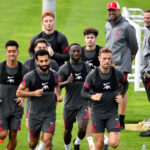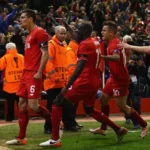Steven Gerrard opens doors to management return with talks planned

There are stories in football that never truly end, stories that circle back to where they began, carrying the same passion, pain, and burning desire that first ignited them. For Steven Gerrard, his story feels like one of those. The Liverpool legend, the man who carried Anfield on his shoulders for nearly two decades, now stands once again at a crossroads. He has lifted trophies, he has suffered heartbreaks, and he has been praised and criticized as both a player and a manager. But deep down, Gerrard knows something—his football journey is not finished yet.
It has been years since Gerrard swapped his boots for the dugout. Many thought that his transition into management would be smooth, as if his leadership as Liverpool captain would naturally carry him to success. For a while, it looked that way. At Rangers, Gerrard built a team that defied all odds. He broke Celtic’s dominance, ending their dream of ten consecutive league titles. He restored pride to Ibrox and reminded everyone of his tactical intelligence and fighting spirit. That season, he was unstoppable. His Rangers side didn’t just win—they conquered.
But football, just like life, is full of unexpected turns. Gerrard’s move to Aston Villa was meant to be his big step into the Premier League, the stage where he could prove he was ready for the Liverpool job someday. Yet, things didn’t go as planned. The results were inconsistent. The energy he brought to the club faded. Players didn’t respond the same way, and the same confidence he had in Scotland began to slip through his hands. The same press that once called him the “next great English manager” turned their headlines into questions: “Was Gerrard ready for this level?” “Has he lost his magic?”
Eventually, Aston Villa showed him the door. It was a tough moment for a man who never liked losing. Gerrard left with his pride wounded but not broken. He took some time away, yet his love for the game never faded. That’s when he made another bold decision—he moved to Saudi Arabia to manage Al Ettifaq. It was a move that surprised many. The Saudi Pro League was making big noise with superstar players like Cristiano Ronaldo and Neymar, but Gerrard’s experience there was far from glamorous. He arrived with hope, but the reality was complicated. Different culture, different environment, different expectations.
By January, it was over. Gerrard decided to walk away from Al Ettifaq, realizing that sometimes, not every opportunity is meant to be forever. He returned to England, not as a defeated man, but as one who had learned, grown, and reflected deeply on what he wanted next. For now, he has been enjoying life away from the pressure. He spends more time with his family, attends Formula One races, and occasionally joins his old teammates in charity matches. Yet even when he smiles in public, you can tell—the fire inside him has not gone out.
Now, whispers are growing louder that Gerrard could return to the club where his managerial career truly came alive—Rangers. Reports from Sky Sports say talks are being planned between Gerrard and Rangers over a sensational return to Ibrox. The timing seems right. Rangers recently parted ways with Russell Martin, and the fans are desperate for a leader who knows what it means to win in blue.
In a recent conversation on *Rio Ferdinand Presents*, Gerrard finally opened up about what’s next for him. His words carried both honesty and hunger, like a man who has walked through fire but still dreams of rising higher. “I’d love another go at some point,” he said. “I want to change a few things, improve a few things, and come back fresh, with a few different people around me.” His tone was calm but filled with determination. Gerrard spoke like someone who has done his self-evaluation and knows exactly what went wrong before—and what needs to change.
He talked about learning from his past experiences. “I know where I’m strong,” he said, “and I know where I need good support and special skill sets to make me better and stronger.” That statement alone showed growth. Gerrard is no longer the impulsive young manager who thought passion alone could win games. He now understands that football management is about structure, patience, and having the right people beside you.
He looked back at his time at Rangers and remembered the bond he had with his staff—Gary McAllister and Michael Beale. “I felt like I had that to a tee at Rangers,” he recalled proudly. That chemistry, that trust, and that understanding were key to his success. But at Aston Villa and Al Ettifaq, there were too many changes in his coaching team, too many new faces and philosophies that didn’t align. “A lot of coach changes didn’t help me,” he admitted. It was a subtle but honest reflection of how unstable environments can damage even the best intentions.
Gerrard’s words were filled with lessons. He didn’t sound bitter or defeated; he sounded ready. Ready for something new, but wiser than before. He spoke about his love for challenges and his desire to face them again—but only under the right conditions. “There’s a part of me that still feels there’s a bit of unfinished business,” he confessed. “I want a certain type of challenge. If the ideal one becomes available, I’ll jump at it. If it doesn’t, I won’t go back in.”
That’s the thing about Gerrard—he’s not desperate. He’s deliberate. He knows his worth, and he’s waiting for the right fit. He wants to manage a team that fights to win, not one that simply wants to survive. “I want to be at a team that’s going to compete to win,” he said, “because I think that suits me better.” Those words perfectly describe his DNA. Gerrard was never built for mediocrity. Whether as a player or manager, he thrives where there’s fire, competition, and glory to chase.
The possible reunion with Rangers feels poetic. It’s where his managerial reputation was born. It’s where he built belief, confidence, and a sense of purpose. For the Rangers fans, Gerrard is more than a name—he’s a memory of victory, of a time when they stood tall again in Scottish football. For Gerrard himself, returning to Ibrox might feel like returning home, not just to rebuild a club, but to rebuild himself.
Football is filled with comeback stories, but few are written with as much heart as Gerrard’s. From the kid who grew up in the streets of Whiston dreaming of Anfield, to the captain who led Liverpool through miracles in Istanbul and heartbreaks in the Premier League, to the coach who’s still searching for his perfect chapter—his journey is the definition of passion.
There was a time when Gerrard was seen as the natural heir to Jurgen Klopp at Liverpool. The idea made sense: a club legend taking over from a world-class manager, leading his boyhood club once again but this time from the sidelines. But life had other plans. Klopp’s era lasted longer than expected, and Gerrard’s inconsistent spell at Villa made that dream more distant. Then came Arne Slot, the new Liverpool boss, and the conversation around Gerrard’s return to Anfield faded away.
But deep down, Gerrard hasn’t given up on that dream. He knows he needs to prove himself first. He knows that being a legend on the pitch doesn’t automatically make him a great manager—he has to earn it all over again. Football doesn’t reward past glory; it demands fresh victories. Gerrard’s focus now is to rebuild his reputation, one challenge at a time.
As he waits for the next step, Gerrard continues to stay close to the game. He attends matches, talks to young players, and keeps learning. He is not afraid to admit that he made mistakes. That humility might just be his biggest strength now. In a world where many ex-players rush to defend their ego, Gerrard’s willingness to reflect shows maturity. He has seen both the beauty and the brutality of football management.
Rangers could be the perfect stage for his rebirth. The fans would welcome him like a hero. The players would respect him instantly. And above all, Gerrard knows the culture, the pressure, and the pride of the badge. If he returns, it won’t just be about tactics—it will be about emotion, motivation, and redemption.
Some people believe Gerrard’s time as a top manager has passed, but that would be a mistake. Legends like him are never truly done. They just wait for the right moment to rise again. The fire that once made him drag Liverpool to Champions League glory in Istanbul is still inside him. It’s quieter now, more controlled, but it burns just the same.
In football, you can lose jobs, but you never lose your identity. And Steven Gerrard’s identity has always been about leadership, resilience, and comeback. He has failed, yes, but he has also learned. He has been doubted, yes, but he has also evolved. The next chapter of his journey will reveal whether he can turn those lessons into legacy.
For now, the world waits. Rangers wait. Liverpool fans watch closely. And Gerrard, calm but hungry, waits for that phone call that will define his future. When it comes, he will be ready—ready to lead, ready to fight, ready to prove that the fire of a legend never truly















